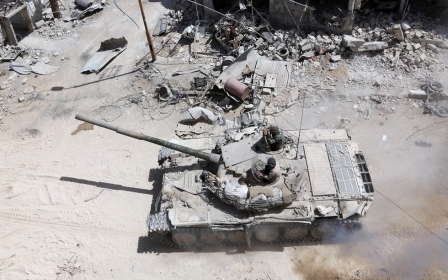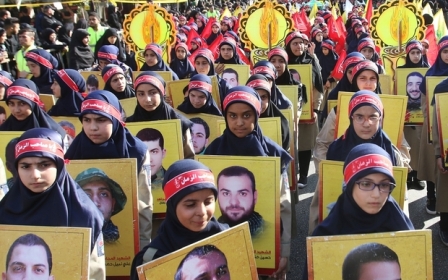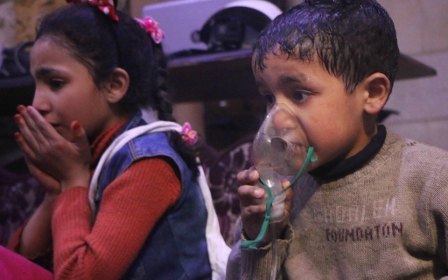US readies response to Syria attacks after UN clash with Russia
US President Donald Trump cancelled his first official trip to Latin America this week in order to focus on responding to a suspected chemical weapons attack in Syria, the White House said on Tuesday, as rival US and Russian drafts to establish a UN investigation failed to pass at the Security Council.
The US draft resolution aimed to establish a year-long probe to ascertain blame for chemical weapons attacks in Syria.
Twelve council members voted in favour, while Bolivia joined Russia in voting no, and China abstained. A resolution needs nine votes in favour and no vetoes by Russia, China, France, Britain or the United States to pass.
"This resolution is the bare minimum that the council can do to respond to the attack," US Ambassador to the UN Nikki Haley told the council before the vote.
The Russian draft would have required investigators to report to the Security Council, which could then attribute responsibility.
Seven members voted against the Russian measure and two abstained.
The drama at the United Nations came as night fell on Damascus and the long-suffering Syrian population braced for the diplomatic dance to transform into a new round of international military action.
Both Trump and his defence secretary Jim Mattis abruptly cancelled upcoming travel plans, as the USS Donald Cook - a guided-missile destroyer - moved to within striking range of Syria.
The United States, backed by Britain and France, has said it is ready to act with or without support from the United Nations.
The White House said that, in a telephone call, Trump and British Prime Minister Theresa May "agreed not to allow the use of chemical weapons to continue".
France and Turkey also joined in the intensifying rhetoric against Syrian President Bashar al-Assad on Tuesday.
Paris said it will retaliate against the Syrian government if evidence emerges that it was behind a recent suspected chlorine gas attack in a rebel-held enclave, government spokesman Benjamin Griveaux said.
"If the red line has been crossed, there will be a response," Griveaux told Europe 1 radio, adding that intelligence shared by President Emmanuel Macron and Trump "in theory confirms the use of chemical weapons".
In a phone call on Monday night, the two leaders again discussed the latest alleged chemical attack in Syria's civil war, in the city of Douma near Damascus on Saturday.
Rescuers and medics in Douma say more than 40 people died after the suspected poison gas attack in the last rebel-held pocket of the one-time opposition stronghold of Eastern Ghouta.
France has repeatedly warned that evidence of the use of chemical weapons in Syria is a "red line" that would prompt French strikes on Syrian government forces.
On Tuesday, Saudi Arabia also expressed readiness to take part in a potential military strike against the Syrian government.
"If our alliance with our partners requires it, we will be present," Crown Prince Mohammed bin Salman said at a news conference with French President Emmanuel Macron, wrapping up a three-day visit to Paris.
Earlier, Foreign Minister Adel al-Jubeir had told reporters that a number of countries were holding consultations over the alleged gas attack.
"Our position is that those responsible have to be held accountable and brought to justice," he said.
Fact-finding mission
The global chemical weapons watchdog said on Tuesday that it will "shortly" deploy a fact-finding team to Douma.
Coinciding with a request from both Syria and its ally Russia to investigate the allegations, "the OPCW technical secretariat has requested the Syrian Arab Republic to make the necessary arrangements for such a deployment," the Organisation for the Prohibition of Chemical Weapons (OPCW) said in a statement.
We have a lot of options militarily and we'll be letting you know pretty soon... probably after the fact
- US President Donald Trump
Trump, for his part, said on Monday that "we have a lot of options militarily and we'll be letting you know pretty soon... probably after the fact".
The statement came following a warning on Sunday night that a chemical weapon attack by Assad would be "met forcefully".
"We're making a decision as to what we do with respect to the horrible attack that was made near Damascus and it will be met and it will be met forcefully," Trump said, surrounded by his national security team.
In April last year, Trump launched a cruise missile strike against a Syrian air base after a previous chemical attack that UN monitors later pinned on Assad's government.
Moscow has denounced the claims as "fabrications," with its UN envoy warning on Monday that the possibility of military action was "very, very dangerous".
New MEE newsletter: Jerusalem Dispatch
Sign up to get the latest insights and analysis on Israel-Palestine, alongside Turkey Unpacked and other MEE newsletters
Middle East Eye delivers independent and unrivalled coverage and analysis of the Middle East, North Africa and beyond. To learn more about republishing this content and the associated fees, please fill out this form. More about MEE can be found here.




